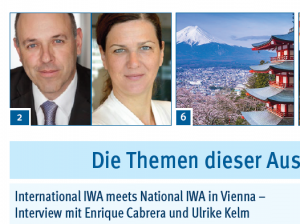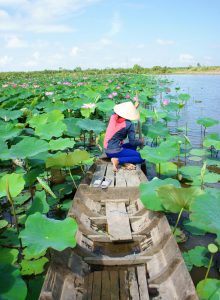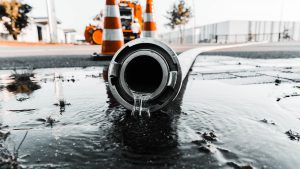Valuing water, the SDGs, IWA and other topics … an interview
Christian Loderer, IWA Austria, interviews Enrique Cabrera, IWA Vice-President, and Ulrike Kelm, IWA Communications Manager.
Photo: Enrique Cabrera, IWA Vice-President
Photo source: FGWW
On the 15th of November 2018 Mr. Cabrera, actual IWA Vice-President since the World Water Congress 2018 held in Tokyo, and Ms. Kelm, IWA communications manager since August, attended the Club IWA. This event is organised by the IWA Governing Member in Austria for their members once a year.
More information on the annual IWA Club Austria event here….
The IWA Austria newsletter team used the opportunity to get an exclusive interview with both of them to talk about future IWA strategies and personal opinions on water related topics. We want to thank Ms. Kelm und Mr. Cabrera for having this interview.
Christian Loderer: Mr. Cabrera, you got elected as IWA Vice-President for the next two years. What was your motivation to go for it?
Enriquie Cabrera: IWA has been very important in my career as a water professional since the very beginning. I have participated in many different roles within the Association and in a way, I feel it is my home. I wanted to keep working for the Association and to try to return all the good it has done for me. Additionally, I think that both, the association’s and the publishing landscape are changing. By running for the Vice-Presidency I thought I could try to contribute with my experience to continue helping IWA Publishing on one hand, and try to develop the digital version of IWA for the future on the other hand.
Loderer: Ms. Kelm you are the communications manager since August 2018. So let say a “young professional” in the IWA staff family. What is your impression of IWA in this short time period?
Ulrike Kelm: I have been working in the international water sector for nearly two decades in different settings and for different institutions in this worldwide water family. Now, joining IWA is kind of a natural next step, working for the global network of water professionals who come from all the different professional spheres our water world offers. I am proud of being part of this family and of this organisation that has stretched its roots already for over 70 years to provide a platform for the people working for, and shaping our water future.
Loderer: The “value of water” is a very common buzzword in the water society. What value has water in your life and how would you (and you have different professional backgrounds) explain to different stakeholders not working in the sector what the “value of water” is?
Kelm: The value of water can be described easily: There is no life without water, water is life. In this sense, water has an universal value. The many cultures, religious rituals and traditions in our societies around the globe demonstrate that as they all embrace water. The connection to water is much more than just analyzing it as H2O. Water is valued for what it is – the essential of all lives. Nowadays, there has been made a connection to price tags when talking about value. But is this the right definition? A diamond is nice and beautiful and has a high price tag on it. But you can easily live without it. And looking at water … what we need is safe drinking water and safe wastewater treatment. We have to appreciate the value of water in this way that we see the water as part of the natural cycle. We take it and we return it, we use it and we reuse it. This is what we in the sector work about, we take care of this precious resource, indispensable for all life on earth.
Cabrera: Water and air are basically the only things human beings need daily to be able to continue living (we can live without food for a few days). The absence of sanitation services is the source of many life-threatening diseases. It is almost impossible to assess the value of water. Ii is a human right and therefore invaluable. However, in Europe we are so used to the luxury of getting safe drinking water out of our tap every time we need it, that we may not realize all the work and resources that are necessary for that simple action to happen. I think it is part of our communication challenge to educate our societies so the perception of water services improves significantly.
Loderer: Mr. Cabrera, you focused over years on the topic “benchmarking in the water sector” which can also be interpreted focusing on the “value of water”. What fascinated you on this topic and where do you see the big challenges in a very heterogeneous society to come to a “common denominator”?
Cabrera: Water services are usually operated as natural monopolies. Users can only get them from a single provider. This lack of competition sometimes leads to operators being quite conservative, lacking innovation and not striving for efficiency as much as they could. This is quite understandable as there are fewer external challenges and drivers than in a free market. The comparative performance assessment can be a great way to reintroduce motivational drivers for operators, and to acknowledge that there may be alternatives to processes and procedures. Benchmarking can help to improve those processes. A common denominator in water is very complex for local circumstances can be very different. However, the water sector should strive for standard levels of services where all citizens can receive equivalent water and sanitation services.
Loderer: Ms. Kelm you will support the IWA as a communications manager. The IWA as I know it is a member driven organization. What will be the IWA communication strategy to become a “stand alone” or “front-runner” between the jungle of water organizations and how will you keep it attractive for the next generation, the young water professionals?
Kelm: IWA is a unique organisation. It is the network of all shades of water professionals continuously growing. It provides them a platform to connect and a network, to progress in the sector and with their professional careers. It supports the water professionals to foster innovation and to close the gap between science and practice. Working in communications means that I have the opportunity to liaise with all to help distill key messages, to get insights from latest developments and robust practice, and to link this to the international community inside and outside the water sector.
Loderer: Mr. Cabrera, apropos “Young Water professionals”. You were one of the former IWA-YWP Award winners. How will IWA keep on going with the Young Water Professionals initiative?
Cabrera: IWA’s future is in the hands of the young water professionals. The Association is well aware of their importance and they key role they need to play to achieve the many challenges the world faces around water. And IWA can also be very important to those younger water professionals. In my case, IWA helped to shape my career, develop my expertise, and meet some of the topmost experts in the world to later work along with them. The younger generations have developed new ways to interact with each other. In IWA we need to be able to continue promoting our core values of network and content also adapting to these new channels and codes. In other words, we need to keep doing what we do best, while we allow ourselves to evolve so we can also do it in different and exciting ways in addition to the traditional ones.![]()
Loderer: A final question to both of you: The SDGs where fixed for trying to find a common solution for the global Energy-Water-Food Nexus problem. But if you follow media in the last couple of weeks the UN migration agreement get more and more discussed between countries and some points get scrutinized. At the end both the SDGs and the UN migration agreement goes hand in hand. So can the Water sector become a strong partner in this discussion (e.g. lack of water resources in different regions in the world or clime refugees)?
Kelm: Water is already a strong theme in all these discussions and in the various dimensions. Earlier this year, in summer 2018 at the UN High Level Political Forum, the dedicated water goal, the SDG6, was revised by the international community and it was clearly stated that water is indispensable for reaching all the Global Goals. Water is a strong issue even within the UN, who have a coordination mechanism connecting all UN entities on the diverse water topics and relate them to the different branches outside our water box. And here, this powerful multilateral organisation reaches out to IWA to get technical and expert support, the knowledge and expertise from our membership. And so do other multilateral organisation who need our membership’s expertise to help finding solutions for our tomorrow’s water world. IWA is part of the international discussions and mechanisms and is a highly recognized partner. This is why IWA works with them, for example with the regional development banks such as the Inter-American Development Bank on AquaRating, or with the OECD on water governance. We all have to collaborate, and the water sector, the IWA membership reaches out its hand to support and provide solutions to the water problems our world is facing, and it is the decision makers’ and world leaders’ role to use this knowledge and expertise.
Cabrera: As I mentioned before, water is essential for life. The absence of water may create dramatic situations, and conflicts and migrations could be disastrous consequences of this lack of water. In IWA we are fundamentally a technical association, and our role is to develop and provide solutions that could be used to avoid these dramatic circumstances. These solutions will be fundamental to solving the greater problems. However, it is the role of world leaders and decision makers to allow professionals to implement these solutions. In IWA we are ready to significantly contribute to these processes, and the Association has already made part of its strategy its focus in the achievement of the SDGs, which would represent a very substantial step for the well-being of people in the world.
Loderer: Thanks for your time and the interview!
See interview here…. 



